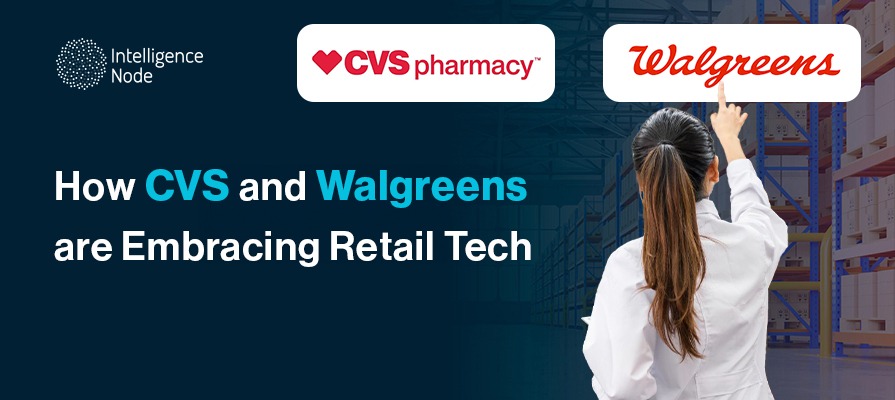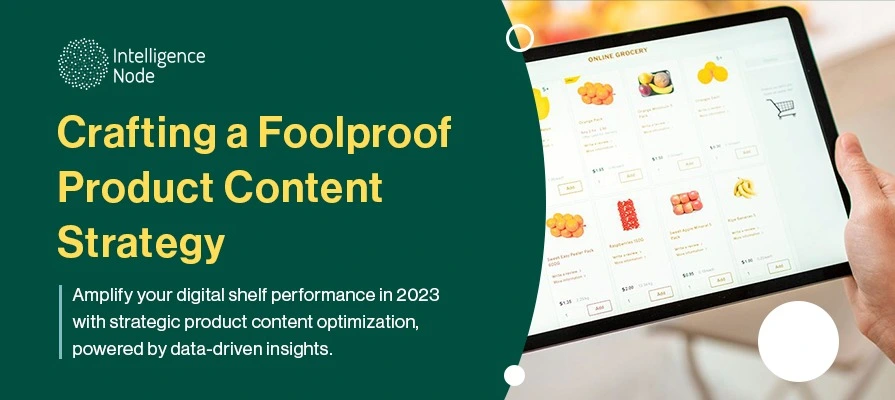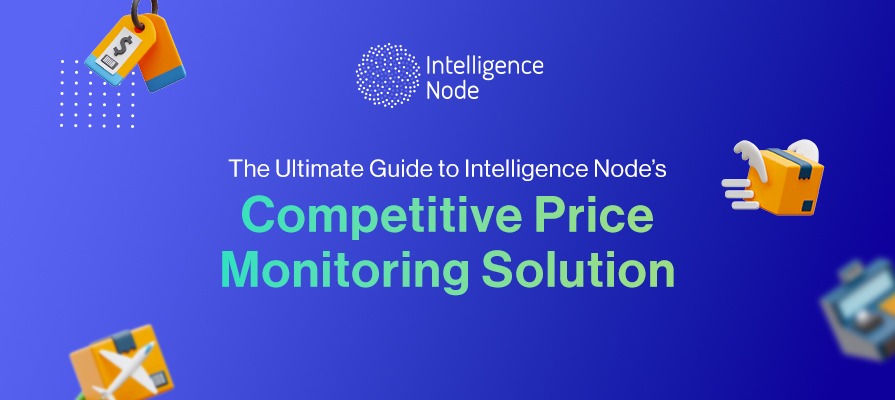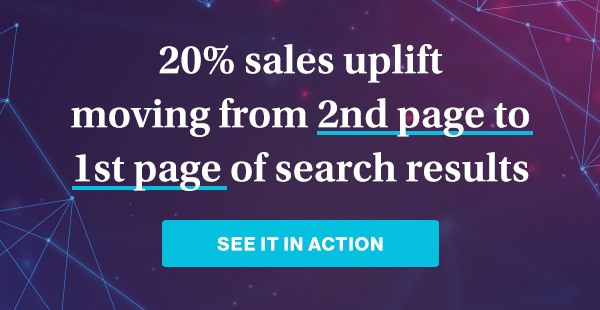Exploring Market Growth, Consumer Attitudes, and Tech Trends Shaping the Retail Pharmaceutical Industry
The retail pharmacy industry faced immense challenges and exhaustion during the COVID-19 pandemic as it grappled with surging demand for essential medications, increased pressure on supply chains, and the need to implement strict safety protocols to protect both staff and customers. Today, as the world settles into the new normal, it is picking up pace to rapidly implement innovative solutions and cater to growing customer demands.
Currently, the retail pharmaceuticals industry is experiencing robust growth, with a projected CAGR of 4.6% from 2021 to 2026, driven by factors such as increasing healthcare spends and expanding access to healthcare services. Leading manufacturers and brands dominate the market, with companies like CVS Health, Walgreens Boots Alliance, and Rite Aid commanding significant market share.
Some of the most profitable products in the industry include prescription medications for chronic conditions, over-the-counter drugs, and personal care items. Over the next five years, medicine spending will grow between 1–4% on a list price basis and -2 to 1% after discounts and rebates.
Read ahead to delve into the latest market trends, industry insights, and consumer behaviors shaping the dynamic landscape of retail pharmacy chains.
2023’s Impact on Retail Pharmacy Sales
In recent years, global economic disruptions have impacted every industry, including the pharmaceutical sector. In response to rising production expenses attributed to supply chain issues and inflation, many companies raised their prices. However, the pharmaceutical industry faces challenges in responding to market fluctuations due to the regulation of prescription drug fees. These regulations have a significant bearing on product availability, pricing, and marketing practices. Furthermore, brand recognition plays a pivotal role in performance and sales. In the retail pharmacy industry, consumers often place trust in established and well-known brands for their healthcare requirements.
To effectively tackle these challenges, brands need to embrace technological innovation. Modernized processes can enhance supply chain efficiency, create impactful pricing models, and even boost sales. With powerful analytics, retailers can adapt to changing consumer behaviors, navigate the regulatory landscape, and remain competitive year-round.
Top Tech Trends Dominating the Pharmaceutical Industry
While dealing with global challenges, pharmacies must uphold superior standards of operations. Consumers expect retail pharmacy brands to ensure safety, quality, timeliness, and efficiency. To achieve these expectations, pharmacy software solutions have emerged as valuable tools. These can eliminate human errors, automate insurance and medicine verification, facilitate supplier and healthcare provider communication, and more. By leveraging these software technologies, pharmacies can effectively allocate more time toward growth and development while fulfilling business and compliance commitments. With advancements in the field, such retail solutions are more accessible than ever, rapidly evolving, enabling streamlined operations and compliance with regulatory standards.
As such, the following trends are currently dictating the direction of the sector.
AI and Predictive Analytics
Artificial Intelligence (AI) and predictive analytics have become indispensable tools for pharmacies. They provide valuable support in various aspects of their operations. By accessing both historical and real-time data from parcel carriers, these tools enable pharmacies to make informed decisions about their logistics, enhancing the quality of their delivery services. Similarly, accurate consumer data enables brands to adapt to shifts in the market in real-time.
AI and predictive analytics provide valuable demographic information that helps pharmacies understand their customer base better. Accurate consumer data is key in enabling brands to customize offerings accordingly. With these technologies, pharmacies can accurately identify states and zip codes that have consistent delivery levels, optimizing their operations for reliable service. They also help minimize reships and product losses, leading to improved efficiency and cost savings. Ultimately, the integration of AI and predictive analytics empowers pharmacies to deliver better services to their customers and optimize their business operations.
Related read: Leveraging Machine Learning to Drive Retail Demand
Data Analytics
The pharmaceutical industry is leveraging data analytics to gain insights into various aspects of their operations. It is a valuable tool for modern pharmacies that seek to remain competitive in today’s healthcare landscape. By utilizing analytics, pharmacists can identify high-demand products, predict demand, and optimize stock levels. Additionally, analytics can help pharmacists stay ahead of product trends by proactively adjusting inventory.
One noteworthy example of this is Pharmacy Renewal, a cutting-edge data analytics system developed by Walgreens. Rex Swords, RPh, the group vice president of centralized services for Walgreens, noted that this system is one of the largest transformations in the company’s history. By utilizing historical data, Pharmacy Renewal can more accurately predict and replenish a store’s inventory. Data-driven insights enabled the brand to make more informed decisions about their ordering patterns, saving them time and resources.
Competitive Pricing
A well-crafted pricing strategy plays a crucial role in optimizing revenue and profits while securing a competitive edge in attracting pharmacy customers.
A well-crafted pricing strategy plays a crucial role in optimizing revenue and profits. Modern pricing tools help brands secure a competitive edge in attracting price-conscious pharmacy customers.
To maintain the same prices across platforms including physical stores, online platforms, mobile apps, and other digital touchpoints, retail pharmacy brands adopt integrated pricing strategies and automated price updates. This approach differs for wellness products and cosmetics. Here, brands compete within the industry through tactics like strategic partnerships and supplier negotiations. Psychological pricing strategies such as bundle pricing, promotions, and even loyalty programs help attract shoppers.
In recent years, generic medications have gained significant popularity as cost-effective alternatives to brand-name drugs. For example, Atorvastatin is the generic medication alternative of Lipitor, and is approximately 95% cheaper than the branded drug. Similarly, Sertraline is the generic alternative of Zoloft, and costs 90% less. According to recent reports, the US generic drugs market size was evaluated at USD 435.54 billion in 2022 and is projected to hit around USD 721.54 billion by 2032, registering a CAGR of 5.18% from 2023 to 2032.
Online Inventory Management
Retail pharmacy chains are utilizing smart inventory management systems that utilize IoT devices and data analytics. These systems optimize inventory levels, reduce stockouts, and enable real-time tracking and monitoring of pharmaceutical products. This technology is becoming increasingly important in the pharmaceutical industry to improve efficiency, reduce costs, and ensure product safety. The global Pharmacy Inventory Management Software Market is expected to grow at a significant CAGR of +9% during the forecasting period (2023 to 2030).
The Top Retail Pharmacy Brands in the US in 2022-23
CVS Pharmacy
At present, the retail arm of CVS Health, known as CVS Pharmacy, serves as a prominent health solutions provider. It presents a plethora of products, from prescription drugs and over-the-counter medications. The brand also provides personal care items, health and wellness provisions, beauty products, as well as vitamins and supplements. Additionally, it also caters to baby care necessities.
Keeping up with current trends and embracing innovation, CVS Pharmacy invests heavily in digitally integrated shopping experiences. This enables customers to enjoy convenience and efficiency through the website and mobile applications. The platforms’ online prescription refills and personalized health recommendations features set it apart in delivering an effortless shopping experience.
Via strategic pricing tactics, CVS Pharmacy is committed to offering highly competitive prices for a vast range of products. By leveraging its network of suppliers, CVS Pharmacy manages to negotiate favorable manufacturer agreements. In turn, the brand is able to ensure affordability and accessibility for consumers.
CVS Pharmacy’s growth strategy includes strategic acquisitions and partnerships to expand its reach and diversify offerings. For instance, the acquisition of Aetna allows CVS Pharmacy to integrate insurance coverage with pharmacy services, creating a comprehensive healthcare experience.
CVS Health has been providing a robust omnichannel digital experience to its customers. In a recent article, CVS Health President and CEO Karen Lynch said, “We remain critically focused on digital engagement and achieved a significant milestone this quarter, exceeding 50 million unique digital customers. These customers are driving meaningful results with digital sales in the quarter up more than 30% versus the prior year. Engagement levels are strong as these customers spend 2.4 times more than our non-digitally engaged customers and at higher margins,” adding that CVS will continue to innovate and expand digital offerings.
Walgreens
This retail pharmacy player sets a new standard in digital commerce, advancing healthcare through innovative strategies that foster competitive advantages. Its numerous storefronts provide a comprehensive selection of prescription medications to fulfill diverse healthcare needs. Further, the store holds a range of over-the-counter drugs, beauty/personal care items, and vitamins/supplements. Its online store, prescription refill app, and Balance Rewards program featuring digital coupons/rewards seamlessly integrate with modern customer journies and facilitate sales.
Moreover, Walgreens expanded its health and beauty portfolio by collaborating with healthcare providers and providing in-store clinics and consultations. In line with its unwavering commitment to regulatory compliance, the retailer places strict emphasis on safeguarding patient privacy and ensuring the sale of prescription medications online complies with industry regulations.
Walgreens, like many other retailers, has embraced omnichannel. Apart from the brick-and-mortar stores, customers can shop on their website and mobile app. Today, the brand offers an integrated experience (BOPIS- Buy Online Pickup In-store). This enables customers to browse the local store’s inventory online and pick up the items from the store personally. Employees can use the app’s in-store mapping feature to better navigate customers through the shelves, and order a product online if a customer can’t find one in-store.
Walgreens has implemented a microservices solution from Blue Yonder called Luminate Commerce to augment its existing digital solution. In June 2022, it reported that the new digital solutions helped it grow their digital sales by 116% over the past two years.
Tech Solutions for the Success of Retail Pharmacy Brands
To sum up, the adoption of technological solutions is vital for achieving success in the fiercely competitive retail pharmacy sector. With Intelligence Node’s cutting-edge software, retailers can access highly accurate real-time analytics to aid operations. These data-backed insights enable them to enhance pricing strategies, satisfy consumer needs, and maximize profitability. Utilizing this solution gives pharmaceutical retailers a competitive advantage while improving efficiency, bolstering sales, and strengthening their market position. In today’s rapidly advancing industry, embracing technology can make or break retailers striving to stay competitive and surpass business goals. Modern pricing solutions such as Intelligence Node equip businesses with the necessary tools to thrive in the modern retail pharmacy market.
Intelligence Node offers an AI-driven Price Intelligence software to get insights into your competitor prices and compete with them in real-time. Book a demo to learn more!




